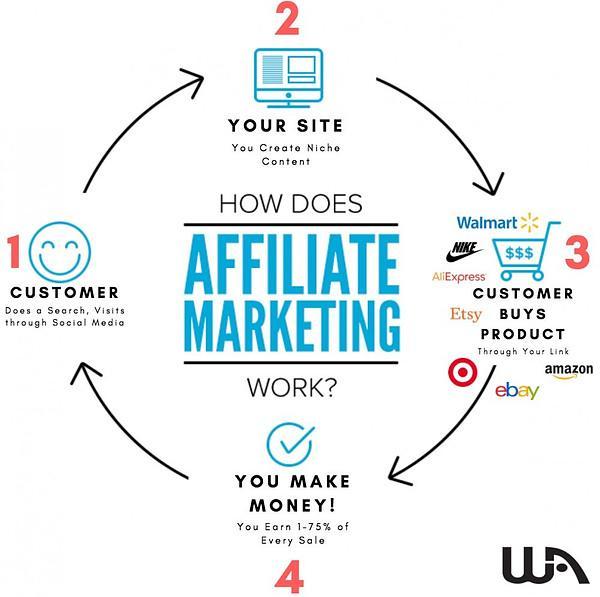Affiliate Marketing Essentials: 10 Surprising Insights You Need to Know
Unlock the potential of affiliate marketing with these ten essential insights that could transform your approach. Discover key strategies and tips that many overlook, giving you a competitive edge in this dynamic field. Don’t miss out on these valuable pieces of knowledge that can elevate your success!
Affiliate marketing is one of the most popular and accessible ways to earn money online. Its low-risk, low-cost model allows individuals to earn commissions by promoting products or services, making it an attractive side hustle or even a full-time business for many. However, there’s much more to affiliate marketing than meets the eye. To help you succeed, here are ten essential things you probably didn’t know about affiliate marketing—and how you can use them to your advantage.

How Affiliate Marketing Works
Affiliate marketing is a partnership between a merchant (the business) and an affiliate (you). As an affiliate, you promote a product or service using a unique referral link. When someone clicks on your link and makes a purchase, you earn a commission.
This model works because it creates a win-win scenario: businesses reach new customers, and affiliates earn money without having to create their own products. For instance, a book blogger might write a review of a novel and include an affiliate link to an online bookstore. When readers purchase the book through that link, the blogger earns a percentage of the sale.
Affiliate marketing’s simplicity and scalability make it an ideal option for anyone looking to earn passive income while sharing products they’re passionate about.
You Don’t Need a Big Budget to Start
One of the most appealing aspects of affiliate marketing is its low startup cost. Unlike traditional businesses, you don’t need to invest in inventory, equipment, or office space. All you need is a platform to share your affiliate links, such as a blog, YouTube channel, or social media account.
If you choose to start a blog, the initial costs are minimal—usually limited to purchasing a domain name and hosting. For those with a strong social media presence, it’s even possible to start with zero upfront costs by leveraging free platforms like Instagram, TikTok, or Facebook. This accessibility makes affiliate marketing an excellent option for anyone seeking additional income without financial risk.
Different Types of Affiliate Programs
Affiliate programs vary widely, and understanding the differences can help you choose the best one for your niche and goals. Two of the most common models are revenue-sharing programs and cost-per-action (CPA) programs.
Revenue-sharing programs, like Amazon’s Affiliate Program, pay affiliates a percentage of each sale generated through their links. This model is ideal for affiliates promoting high-ticket items or generating significant traffic. On the other hand, CPA programs pay a fixed fee for specific actions, such as signing up for a free trial or completing a survey. These programs often appeal to affiliates focused on driving high-volume traffic, even if the individual payout is lower.
By selecting the right type of program, you can align your efforts with your earning potential and ensure your strategies are tailored to your goals.
Choosing the Right Affiliate Programs is Crucial
Success in affiliate marketing depends on promoting products and services that resonate with your audience. When evaluating affiliate programs, consider factors like commission rates, payment terms, and the program’s reputation.
Choose products that align with your niche and genuinely add value to your audience. For example, a tech blogger might promote software subscriptions or gadgets, while a travel influencer might focus on hotel booking platforms or travel accessories. Researching a program’s reliability and tracking capabilities can also help you avoid scams and ensure smooth operations.
Building Trust with Your Audience
Trust is the cornerstone of affiliate marketing. Unlike traditional ads, affiliate marketing relies on personal recommendations. Your audience will only click on your links and make purchases if they believe you’re acting in their best interest.
Be transparent about your affiliate relationships by disclosing when a link is part of an affiliate program. Only promote products you genuinely believe in and have tested yourself when possible. Authenticity resonates with readers and builds long-term credibility, which can lead to a loyal audience that values your recommendations.
SEO is Essential for Success
Search engine optimization (SEO) plays a pivotal role in affiliate marketing. Ranking higher in search results increases your visibility and attracts more organic traffic, which translates into more potential clicks and commissions.
An effective SEO strategy includes thorough keyword research, on-page optimization, and backlink building. For example, a fitness blogger targeting keywords like “best running shoes” can attract an audience actively looking for recommendations, boosting their chances of earning commissions. As your content climbs search rankings, your affiliate links gain more exposure, increasing your passive income potential.

Track Your Performance to Optimize Your Strategy
Understanding what works is essential for growth in affiliate marketing. Most programs provide analytics tools that track clicks, conversions, and earnings. Analyzing these metrics allows you to identify successful strategies and refine your efforts.
Experiment with different content types, such as product reviews, comparison posts, or how-to guides. For example, you might find that a detailed comparison of similar products performs better than a standalone review. By focusing on what resonates with your audience, you can maximize conversions and improve your overall strategy.
Diversify Your Affiliate Partnerships
Relying on a single affiliate program can be risky. Changes in terms or payout structures can impact your income significantly. Diversifying your partnerships by joining multiple programs helps mitigate this risk while offering a wider range of products to your audience.
For example, a health and wellness blogger might initially promote fitness gear but later expand to health supplements, wellness apps, or online courses. Diversification ensures your business remains adaptable to shifts in audience interests or market trends.
Stay Compliant with FTC Guidelines
Transparency isn’t just good for building trust—it’s also a legal requirement. The Federal Trade Commission (FTC) mandates that affiliates disclose their relationships with advertisers. Including a simple statement like “This post contains affiliate links, and I may earn a commission if you make a purchase through these links” keeps you compliant and reinforces your credibility.
Failing to follow these guidelines can result in legal consequences and damage to your reputation. Always err on the side of honesty, ensuring your audience feels confident in your recommendations.
Be Patient—It Takes Time to Build Steady Income
Affiliate marketing isn’t a “get rich quick” scheme. Building a successful business takes time, effort, and persistence. Many affiliates spend months or even years growing their audience and optimizing their strategies before they see consistent income.
Approach affiliate marketing as a long-term endeavor. Keep refining your skills, experimenting with content, and focusing on adding value to your audience. Over time, your efforts will pay off, and you’ll build a sustainable income stream.
Learn how to tap into endless affiliate opportunities here!
Conclusion,
Affiliate marketing is a powerful way to earn passive income, but success requires a strategic approach. By understanding the fundamentals, choosing the right programs, building trust with your audience, and optimizing your efforts, you can create a thriving business that generates income for years to come.


There is a lot of information in this article. At the very beginning, you visually answer questions about the steps needed to do affiliate marketing, and then you explain that business plan. It is interesting that, as I read, you answered some of the questions that would naturally come up. The explanation of types of affiliate marketing presented some choices. I have been an affiliate marketer for a while. I wish I had seen an overview like this one when I was trying to decide if I should take the jump and become an affiliate marketer. I think you will help lots of people make that choice.
Jim
Hello, Thank you for your feedback. We hope this guide will help other future affiliates to make a decision on whether affiliate marketing is right for them and which type of affiliate programs they want to work with.